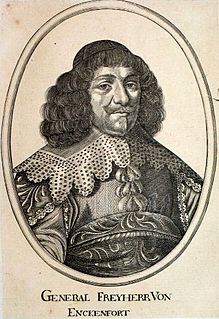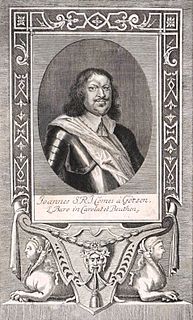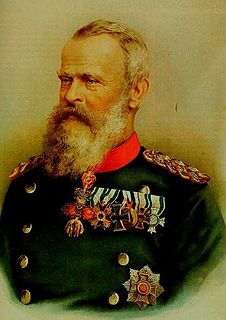 W
WAdrian von Enkevort was a Brabantine nobleman and Generalfeldmarschall who fought during the course of the Thirty Years' War and the Franco-Spanish War (1635–59). Born in 1603, Enkevort followed his father's footsteps becoming an officer, his first success came in 1632 when he distinguished himself at the Battle of Lützen, receiving the rank of Oberstleutnant in the forces of the Holy Roman Empire. He was later sent to the Lorraine front where he assisted Charles of Lorraine in reclaiming his lost realm. After a short spell in the Spanish invasion of Picardy, he returned to Lorraine where he was captured by the French, spending three years in captivity. Upon his return in 1641, he was promoted to Generalfeldmarschall and dispatched to Germany where he campaigned extensively. In 1647, he became the supreme commander of the Bavarian forces, serving in this capacity until the end of the war. He was subsequently ennobled and received the sum of 3,000 Goldguldens for his service during the war. He died in 1663.
 W
WJohann von Götzen was a Lüneburg nobleman and Generalfeldmarschall who fought during the course of the Thirty Years' War. He was married to Elisabeth v. Fal(c)ken (?-1631) Falke, Falcken, Falken, Falkenreck. They had two sons: Johann Sigismund Count of Götzen (1622-1622) and Johann Georg Count of Götzen (1623-1679). At the outbreak of the war Götzen joined the army of the Electoral Palatinate, defecting in to the Imperial side after the battle of Dessau Bridge. He attained the rank of Generalfeldmarschall in both the Electorate of Bavaria and Holy Roman Empire, gaining a reputation for his bravery. He was killed on 5 March 1645, while commanding the Imperial cavalry during the Battle of Jankau.
 W
WPrince Karl Theodor Maximilian August of Bavaria ; and grand prior of the order of Malta, was a German soldier.
 W
WLeopold Maximilian Joseph Maria Arnulf, Prinz von Bayern was born in Munich, the son of Prince Regent Luitpold of Bavaria (1821–1912) and his wife Archduchess Augusta of Austria (1825–1864). He was a Field Marshal (Generalfeldmarschall) who commanded German and Austro-Hungarian forces on the Eastern Front in World War I.
 W
WLudwig III was the last king of Bavaria, reigning from 1913 to 1918. He served as regent and de facto head of state from 1912 to 1913, ruling for his cousin, Otto. After the Bavarian parliament passed a law allowing him to do so, Ludwig deposed Otto and assumed the throne himself. He led Bavaria into World War I, and lost his throne along with the other rulers of the German states at the end of the war.
 W
WLuitpold Karl Joseph Wilhelm Ludwig, Prince Regent of Bavaria, was the de facto ruler of Bavaria from 1886 to 1912, due to the incapacity of his nephews, King Ludwig II for three days and King Otto for 26 years.
 W
WRupprecht, Crown Prince of Bavaria, Duke of Bavaria, Franconia and in Swabia, Count Palatine by (the) Rhine was the last heir apparent to the Bavarian throne. During the first half of the First World War he commanded the 6th Army on the Western Front. From August 1916, he commanded Army Group Rupprecht of Bavaria, which occupied the sector of the front opposite the British Expeditionary Force.
 W
WKarl Philipp Josef, Prince von Wrede was a Bavarian field marshal. He was an ally of Napoleonic France until he negotiated the Treaty of Ried with Austria in 1813. Thereafter Bavaria joined the coalition.